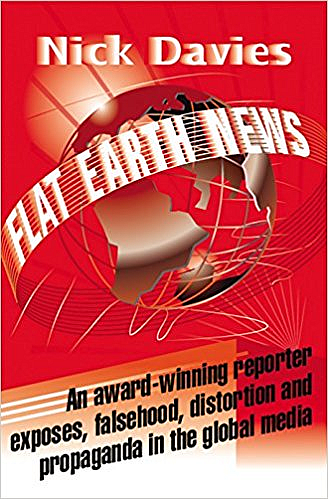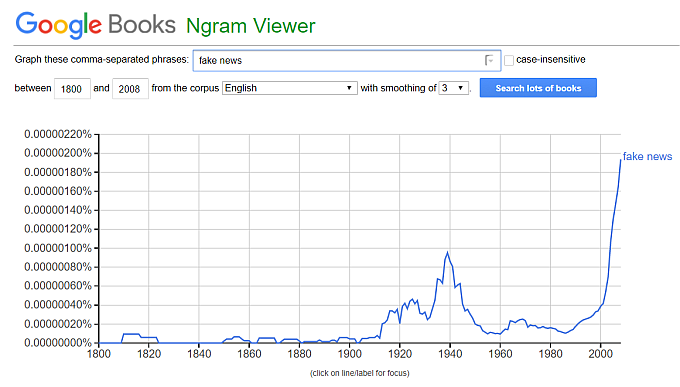READ THIS BOOK! I found it a really interesting, educational and absorbing book.Trigger warning!: This is not about a political statement, though one might want to think that it
is. 
An Award-Winning Reporter Exposes Falsehood, Distortion and Propaganda in the Global Media by Nick Davies (Author)
This is the paperback – February 2, 2009 - but I had the Kindle edition.

Synopsis Review notes:
After years of working as a respected journalist, Nick Davies broke the unwritten rule of the media by investigating the practices of his fellow colleagues. In this eye-opening exposé, Davies uncovers an industry awash in corruption and bias. His findings include the story of a prestigious Sunday newspaper that allowed the CIA to plant fiction in its columns; the newsroom that routinely rejects stories about black people; the respected paper that hired a professional fraudster to set up a front company to entrap senior political figures; as well as a number of newspapers that pay cash bribes to bent detectives. His research also exposes a range of national stories that were in fact pseudo events manufactured by the public relations industry and global news stories that were fiction generated by a machinery of international propaganda. The degree to which the media industry has affected government policy and perverted popular belief is also addressed. Gripping and thought-provoking, this is an insider’s look at one of the world’s most tainted professions.
________________________
Copied from: Flat Earth News: An Award-Winning Reporter Exposes Falsehood, Distortion and Propaganda in the Global Media: Nick Davies: 9780099512684: Amazon.com: Books - <https://www.amazon.com/Flat-Earth-News-Award-Winning-Distortion/dp/0099512688/ref=sr_1_1?ie=UTF8&qid=1513916742&sr=8-1&keywords=Book+Flat+Earth+News>
This reader review (below) says much of what I thought, so it saves me the trouble, though, as an exiled Pom I felt quite at home with what the reviewer called the book's "parochial view" (i.e., being UK-oriented).
Great investigation into how news is made
Reader: Grue
December 2, 2012
Format: Paperback|Verified Purchase
If you're like me, you know that the news is "biased", but you haven't really thought much about specially which forces shape the news and how. After reading this book you will have a much better idea of how news organizations function and what they do and don't do. The main parts of the book are:
1. Economics of newspapers - why pressure to publish is often not conducive to truth
2. News ecosystem - describing the roles of journalists, newspapers, and suppliers such as the Associated Press
3. Outsiders - how companies, lobbyists, and politicians can manipulate the media by exploiting (1) and (2)
4. Details about English newspapers - mostly about how some newspapers in England do illegal stuff
Not being British, I didn't care much about section (4), even though the author is arguably most famous for precipitating the whole Murdoch/Daily Mail scandal. However, the other three sections are excellent and I know of no better book covering similar material. The author clearly has an insider's point of view, not an academic's, but despite some heuristic thinking and proof-by-example, the reader will be forced to admit that there is no reason to believe that the output of the current news system is even roughly true. In short, I was vaguely skeptical before; now I look at most news as being little more than entertaining fiction.
In my opinion the main two faults of the book are that
1) it is parochial and only describes British newspapers in any detail
2) it offers very little constructive guidance on how people _should_ stay informed.
Still, a very thought provoking book. Anyone who reads or watches news (i.e. basically everyone) should read this book or one on the same topics.
______________________________
Copied from: Flat Earth News: An Award-Winning Reporter Exposes Falsehood, Distortion and Propaganda in the Global Media: Nick Davies: 9780099512684: Amazon.com: Books - <https://www.amazon.com/Flat-Earth-News-Award-Winning-Distortion/dp/0099512688/ref=sr_1_1?ie=UTF8&qid=1513916742&sr=8-1&keywords=Book+Flat+Earth+News>
The book (published in 2009) encouraged me to
think and research around the subject, and my research looked around initially at current affairs, and then later I looked for patterns in history (always a good teacher). I was part-way through the book when I pasted together the amusing cartoon (below) and posted it in the silly humour thread. However, having now finished the book and done some more research, I suspect I didn't make the cartoon "strong" enough.
5 steps in The evolution of The Three Wise Monkeys What books are you reading?
What books are you reading?The book's methodical analysis doesn't really say much different to the cartoon ("a picture's worth a thousand words"), except it removes the
element of doubt about how the various forces are behind and driving the fake news, and the attentive reader - having read the book - would probably thus be better-placed to
"think for oneself" when the selfsame purveyors of fake news try to tell him/her how and what to
correctly think about fake news, because the methods that they employ are now become transparently obvious (from the book), if they weren't already. Fake news and propaganda are essentially one and the same thing. The book could relieve one's ignorance to some extent, and could reduce one's credulousness and susceptibility to being manipulated by the media and politicians, but it also helps to retain a natural healthy skepticism - and this is certainly what history shows, for example:
...So the gatekeepers of knowledge and culture in 1530, on losing their gatekeeper position over the narrative, didn’t counter with higher-quality reporting, but instead attacked the technology enabling competition, calling it out as spreading misinformation and irresponsible fake reports. Does any of this seem… familiar?
The law was a complete fiasco. Once people had learned to read competing reporting, there was no unlearning it. The law was repealed shortly thereafter. England went another route to prevent the success of the printing press by establishing a censorship regime with printing monopolies, known as copyright, but that’s a story for another day.
As a final touch, let’s consider the words of Paul Graham, in his excellent essay “what you can’t say”: “No one gets in trouble for saying that 2 + 2 is 5, or that people in Pittsburgh are ten feet tall. Such obviously false statements might be treated as jokes, or at worst as evidence of insanity, but they are not likely to make anyone mad. The statements that make people mad are the ones they worry might be believed. I suspect the statements that make people maddest are those they worry might be true. […] If Galileo had said that people in Padua were ten feet tall, he would have been regarded as a harmless eccentric. Saying the earth orbited the sun was another matter. The church knew this would set people thinking.”
Privacy and narrative remain your own responsibility.
___________________________
Copied from: The great “Fake News” scare of 1530 - <https://falkvinge.net/2017/01/02/great-fake-news-scare-1530/>
The clip below is from a query to the
Google Books engram viewer. The search was input as 1800 to 2017, but apparently the corpus only goes up to 2008 at present.
Interesting that the previous biggest peak(s) in the past were around the war years - probably indicative of the moot cause of the exponential rise we have seen in modern times {i.e., it's propaganda).
Search string: <https://books.google.com/ngrams/graph?content=fake+news&year_start=1800&year_end=2017&corpus=15&smoothing=3&share=&direct_url=t1%3B%2Cfake%20news%3B%2Cc0>

